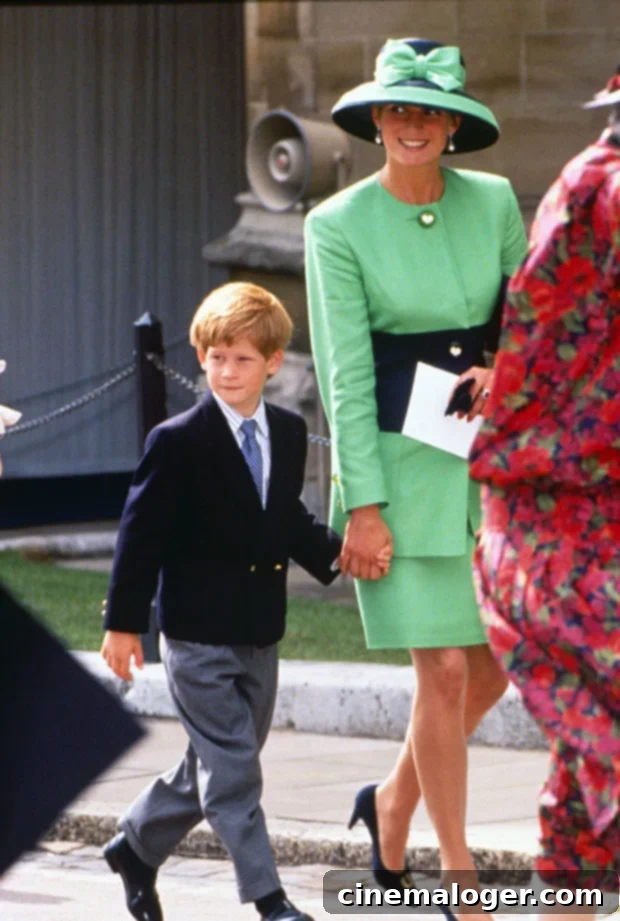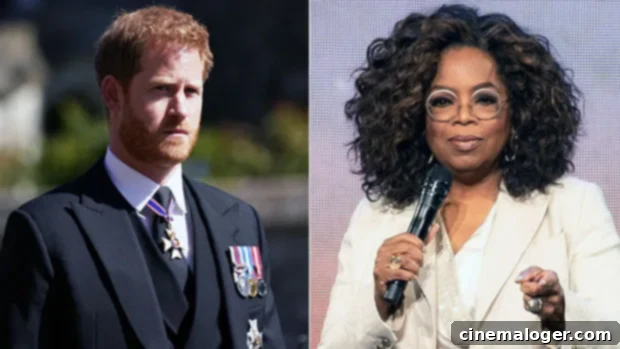Prince Harry and Oprah Winfrey Present “The Me You Can’t See”: A Global Imperative for Mental Health Awareness and Open Dialogue
In a highly anticipated and profoundly significant collaboration, Prince Harry and Oprah Winfrey have joined forces once again, this time as co-creators and executive producers, to launch a groundbreaking documentary series titled The Me You Can’t See. This powerful series, set to debut on Apple TV+, embarks on an intimate yet expansive exploration of mental health and emotional well-being. It promises to feature unflinching, candid discussions with a diverse array of individuals, ranging from globally recognized celebrities to everyday people, all sharing their personal struggles and triumphs with mental health challenges. The recently released trailer offers a poignant and compelling glimpse into the series’ impactful message, highlighting the universal nature of psychological pain and the immense courage it takes to confront it head-on.
The timing of this documentary is particularly critical, arriving at a moment when global conversations around mental health are intensifying, yet the pervasive stigma continues to prevent countless individuals from seeking the help they desperately need. Oprah Winfrey, a renowned figure with a long-standing history of facilitating open and honest dialogue, articulates the series’ fundamental mission in the trailer. She states, with characteristic gravitas, “All over the world, people are in some kind of mental, psychological, emotional pain. Being able to say, ‘This is what happened to me,’ is crucial.” This powerful sentiment underscores the transformative potential of vulnerability and shared experience, aiming to cultivate a global community where honesty about mental health is not merely tolerated, but actively embraced and celebrated as a vital pathway to healing and collective understanding.
Prince Harry’s Deeply Personal Journey: From Silent Grief to Vocal Advocacy
For Prince Harry, the Duke of Sussex, The Me You Can’t See transcends the scope of a mere professional project; it represents a deeply personal endeavor, intrinsically rooted in his own profound experiences with grief, trauma, and a decades-long journey toward emotional healing. Having previously spoken out with remarkable candor about his struggles with depression and anxiety, particularly in the tumultuous aftermath of his mother Princess Diana’s tragic death, Harry brings a uniquely empathetic and authentic perspective to the global discussion. In the trailer, his voice resonates with conviction as he declares, “To make that decision to receive help is not a sign of weakness. In today’s world, more than ever, it is a sign of strength.” This powerful statement directly confronts and challenges deeply ingrained societal perceptions that often erroneously equate seeking mental health support with a lack of resilience, personal failure, or inherent fortitude.
His passionate advocacy is a direct, living reflection of his personal path to recovery and understanding. Harry publicly revealed in 2017 that he sought professional therapy for a significant period following the devastating loss of his mother in 1997. The documentary trailer includes a particularly heart-wrenching and iconic moment: a clip of a stoic, visibly grieving 12-year-old Harry standing solemnly alongside his father, Prince Charles, as his mother’s casket passes during her funeral procession. This powerful visual serves as a stark and unforgettable reminder of the long-term, often insidious, impact of unresolved trauma and how profound early experiences can irrevocably shape an individual’s mental and emotional landscape for decades. Harry’s extraordinary willingness to share such a vulnerable and globally recognized moment from his past underscores the universal nature of grief and the paramount importance of acknowledging and actively addressing emotional wounds, regardless of one’s public status or royal lineage.

Meghan Markle’s Courageous Revelations: A Call for Empathy and Institutional Support
The series also features a brief yet immensely significant appearance from Prince Harry’s wife, Meghan Markle, the Duchess of Sussex, who is seen smiling warmly over Harry’s shoulder as he engages with his laptop. Notably, she is sporting a powerful “Raising the Future” t-shirt. This seemingly small detail carries significant symbolic weight, subtly hinting at their shared vision and profound commitment to fostering a healthier, more emotionally literate future for the next generation, particularly concerning mental well-being. Meghan’s presence in the documentary further amplifies the series’ central message, especially given her own courageous and widely publicized revelations about her profound struggles with mental health.
During their globally resonant and explosive interview with Oprah Winfrey in March, Meghan disclosed with heartbreaking honesty that she experienced suicidal thoughts while she was a working member of the royal family. Her unprecedented honesty sent shockwaves across the globe, immediately prompting widespread and urgent discussions about the immense pressures faced by public figures and, critically, the dire need for universally accessible mental health support systems. “I was really ashamed to say it at the time and ashamed to have to admit it to Harry, especially, because I know how much loss he’s suffered,” Meghan recounted, articulating the pervasive shame and isolation that too often accompany mental distress, making it difficult for individuals to reach out.
She continued to share the terrifying, visceral reality of her experience: “But I knew that if I didn’t say it, that I would do it. I just didn’t want to be alive anymore. And that was very clear and real and frightening.” This raw, unfiltered confession illuminated the dark depths of her despair and the desperate urgency of her need for help. Compounding her suffering, Meghan claimed that when she courageously approached higher-ups within the Royal Institution for assistance, she was reportedly told that seeking such crucial support would be “bad for the family.” This alleged lack of institutional empathy and proactive support for a highly visible member of the royal family serves as a poignant and sobering example of a systemic problem that unfortunately affects countless individuals who face significant barriers to care, whether due to pervasive stigma, a critical lack of resources, or ingrained institutional indifference. Her story powerfully reinforces the series’ core argument for universal empathy, profound understanding, and the urgent establishment of robust, accessible support systems for mental well-being across all societal levels.

A Kaleidoscope of Voices: Uniting Celebrity and Everyday Stories of Resilience
Beyond the deeply personal and moving narratives of Prince Harry and Meghan Markle, The Me You Can’t See strategically casts a wide and inclusive net, featuring candid, heartfelt interviews with an impressive and diverse roster of celebrities alongside ordinary individuals who have bravely navigated their own unique mental health journeys. The trailer provides glimpses of powerful contributions from acclaimed and iconic actress Glenn Close, and global superstar Lady Gaga (born Stefani Germanotta), among other compelling personalities. These segments are profoundly punctuated by moments of intense emotion and, as the trailer poignantly suggests, “a lot of tears,” underscoring the raw honesty, profound vulnerability, and authentic human experience that permeate every aspect of the series.
Lady Gaga’s statement in the trailer is particularly resonant and echoes the sentiments of many who choose to share their struggles: “I don’t tell this story for my own self-service. I’ve been through it and people need help.” Her words encapsulate the altruistic and empathetic spirit that defines the documentary, where the courageous act of sharing personal pain becomes a beacon of hope, a source of solace, and a powerful catalyst for positive change for countless others. The deliberate inclusion of such prominent and influential voices helps significantly to dismantle the pervasive illusion that mental health struggles are confined to specific demographics, socio-economic strata, or hidden corners of society. It powerfully illustrates that emotional pain, anxiety, depression, and the fundamental human need for support transcend fame, wealth, and social status, profoundly affecting everyone from award-winning artists to individuals from all walks of life. By thoughtfully showcasing a diverse range of experiences and perspectives, the series aims to foster a profound sense of shared humanity and collective understanding, making it inherently easier for viewers to recognize and validate their own struggles, and crucially, to feel empowered to seek the help and support they deserve.
Navigating Public Scrutiny: Prince Harry’s Perspective on Media, Privacy, and Mental Well-being
The release of the trailer for The Me You Can’t See follows closely on the heels of Prince Harry’s impactful appearance on Dax Shepard’s Armchair Expert podcast, where he candidly discussed his thoughts on the First Amendment and the American press, stirring up a minor but significant public conversation. During the podcast, Harry openly discussed how the First Amendment, while undeniably a cornerstone of American democracy and freedom, inadvertently fueled what he described as a “feeding frenzy” by the press when he and Meghan relocated to California last year. He expressed his personal view that it was “bonkers” how certain media outlets could exploit legal frameworks and perceived loopholes to invade personal privacy, stating, “I don’t want to start going down the First Amendment route because that’s a huge subject and one which I don’t understand because I’ve only been here a short time. But, you can find a loophole in anything. You can capitalize or exploit what’s not said rather than uphold what is said.”
This commentary, while considered controversial by some, directly connects to the broader and overarching theme of mental well-being and its protection, which is so deeply explored in The Me You Can’t See. The constant, relentless scrutiny and invasive media attention that Harry and Meghan faced, both during their time in the UK and potentially in their new life in the US, undoubtedly placed immense and unsustainable strain on their mental health. His observations highlight a critical point: how external pressures, particularly those emanating from an intrusive and relentless media environment, can profoundly exacerbate psychological distress and create an atmosphere where vulnerability is punished, exploited, or sensationalized rather than genuinely understood and empathized with. His ongoing efforts to advocate for greater privacy and a more ethically responsible media landscape are, in essence, a direct extension of his broader, unwavering commitment to protecting mental health – both his own and that of his family – and ultimately, encouraging the development of a society where individuals feel secure enough to be open about their struggles without the debilitating fear of exploitation or judgment.
A Global Call to Action: The Transformative Impact of “The Me You Can’t See”
The Me You Can’t See is unequivocally poised to be more than just a captivating television series; it aims to be a potent global catalyst for profound change, igniting essential, long-overdue conversations and systematically dismantling the pervasive, damaging stigma that has historically surrounded mental illness. By bringing together the influential voices of Prince Harry and Oprah Winfrey, alongside a powerful and diverse lineup of personal, authentic stories, the documentary seeks to illuminate a clear path from personal pain to collective purpose, from debilitating silence to empowering strength. It serves as an urgent and timely reminder that mental health is not merely a secondary concern but is as fundamentally critical and deserving of attention as physical health, and that the act of courageously seeking help is not merely an option but a vital and necessary step towards cultivating a fulfilling, authentic, and emotionally healthy life.
The series passionately encourages viewers to look beyond superficial appearances and societal facades, to truly understand “the me you can’t see” – the hidden battles, the silent anxieties, the crushing depressions, and the myriad of other emotional challenges that countless individuals bravely endure in silence, often feeling isolated. Its overarching message is crystal clear and resonates with profound empathy: You are absolutely not alone in your struggles, and help is unequivocally available. Through a rich tapestry of shared narratives depicting vulnerability, resilience, and the triumph of the human spirit, the documentary hopes to inspire a greater, more profound sense of empathy across communities, actively encourage individuals to open up about their experiences, and ultimately, foster a world where mental well-being is universally prioritized, openly discussed, and met with compassion and understanding rather than fear or judgment.
Mark your calendars for this pivotal event: The Me You Can’t See premieres exclusively on Apple TV+ on . Prepare for a series that promises not only to educate and inspire but also to profoundly move its audience, sparking a much-needed and long-awaited evolution in how we collectively perceive, discuss, and effectively address mental health globally. This is an invitation to witness and be part of a transformative movement.
